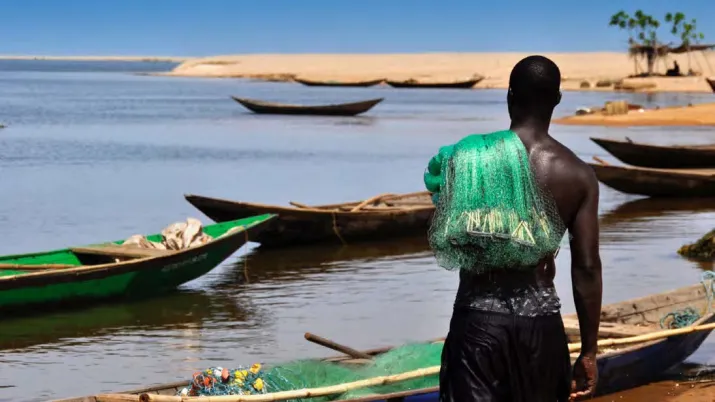A coalition of international organizations has launched the West Africa Sustainable Ocean Programme (WASOP), an ambitious initiative designed to tackle the growing crisis in the region’s fisheries. The program, spearheaded by the International Union for Conservation of Nature (IUCN), the United Nations Food and Agriculture Organization (FAO), and the Fisheries Committee for the West Central Gulf of Guinea (FCWC), seeks to curb illegal fishing, restore marine ecosystems, and foster sustainable development in the blue economy.
The urgency of the initiative is underscored by alarming statistics: the FAO reports that more than half of the fish stocks in West Africa are being exploited beyond sustainable limits. The overexploitation of fish is driven by a combination of domestic and international overfishing, threatening the livelihoods of millions. Across the Economic Community of West African States (ECOWAS), fishing and aquaculture contribute roughly 15 percent of regional GDP, making the sector a critical source of income, nutrition, and employment.

Image source: https://www.expertisefrance.fr/en/projects/wasop
“There is a lack of planning and regulation throughout the region, and this project aims to address those needs,” said Komlan Messie, regional executive director of the Forum of Civil Society Organizations of West Africa (FOSCAO), which played a role in shaping WASOP. Messie emphasized that success will require coordinated regional governance and effective enforcement of existing fisheries regulations.
The European Union has pledged 59 million euros ($68 million) over five years to support WASOP, which will operate across 13 coastal countries: Benin, Cape Verde, Côte d’Ivoire, The Gambia, Ghana, Guinea, Guinea-Bissau, Liberia, Mauritania, Nigeria, Senegal, Sierra Leone, and Togo. While funding allocations for specific countries and projects remain limited, the program is expected to include a 10 million euro ($11.6 million) call for pilot initiatives aimed at local blue economy projects that can be scaled regionally. These projects are intended to promote technological innovation and create sustainable employment opportunities for coastal communities.
For Bassirou Diarra, ocean campaigner with the Environmental Justice Foundation (EJF), the launch represents a promising first step, though implementation will be critical. “It’s an interesting project, but now we have to see how it will be implemented. Regarding illegal fishing, our resources are transboundary, so the approach has to be transboundary too,” he said. Diarra points to the complex regional dynamics of fisheries: many commercial fleets, both local and foreign, operate across multiple national jurisdictions, complicating enforcement and monitoring.
The stakes extend beyond environmental concerns. Overfishing in West Africa has been linked to social and economic pressures that drive irregular migration. EJF research shows that as local fish stocks decline, some fishermen take dangerous journeys to Europe in search of alternative livelihoods, exposing themselves to life-threatening conditions at sea. Diarra stresses that addressing fisheries depletion must include preventive measures to reduce the social vulnerabilities that push communities toward risky migration.
Transparency and coordination are central to the initiative’s potential impact. Messie and Diarra both highlight the importance of open data sharing and public access to information, enabling communities, researchers, and governments to track the status of fish stocks, monitor compliance, and measure the success of interventions. If effectively implemented, WASOP could serve as a model for transboundary marine governance in other regions of Africa, demonstrating how integrated policies can simultaneously protect biodiversity, sustain local economies, and mitigate social risks.
Pilot projects will focus on locally-driven solutions, including sustainable aquaculture, fisheries co-management, and the development of small-scale technology solutions tailored to coastal communities. The ultimate objective is to generate jobs, reduce poverty, and incentivize sustainable management practices that maintain both the ecological and economic value of West Africa’s marine resources.
Read also: IEA World Energy Outlook 2025: What soaring electricity demand means for Africa’s energy future
The program reflects a growing recognition that the blue economy is not simply about exploiting ocean resources but managing them in ways that support environmental resilience, human livelihoods, and regional stability. For countries across West Africa, where coastal populations are rapidly expanding and dependence on marine resources remains high, the success of WASOP could have far-reaching implications for food security, climate adaptation, and economic development.
By linking fisheries recovery to socio-economic outcomes, the West Africa Sustainable Ocean Programme seeks to transform the region’s approach to its oceans, from reactive management to proactive, science-driven stewardship, offering a roadmap for sustainable marine governance across the continent.
Engage with us on LinkedIn: Africa Sustainability Matters
Engage with us on LinkedIn: Africa Sustainability Matters




